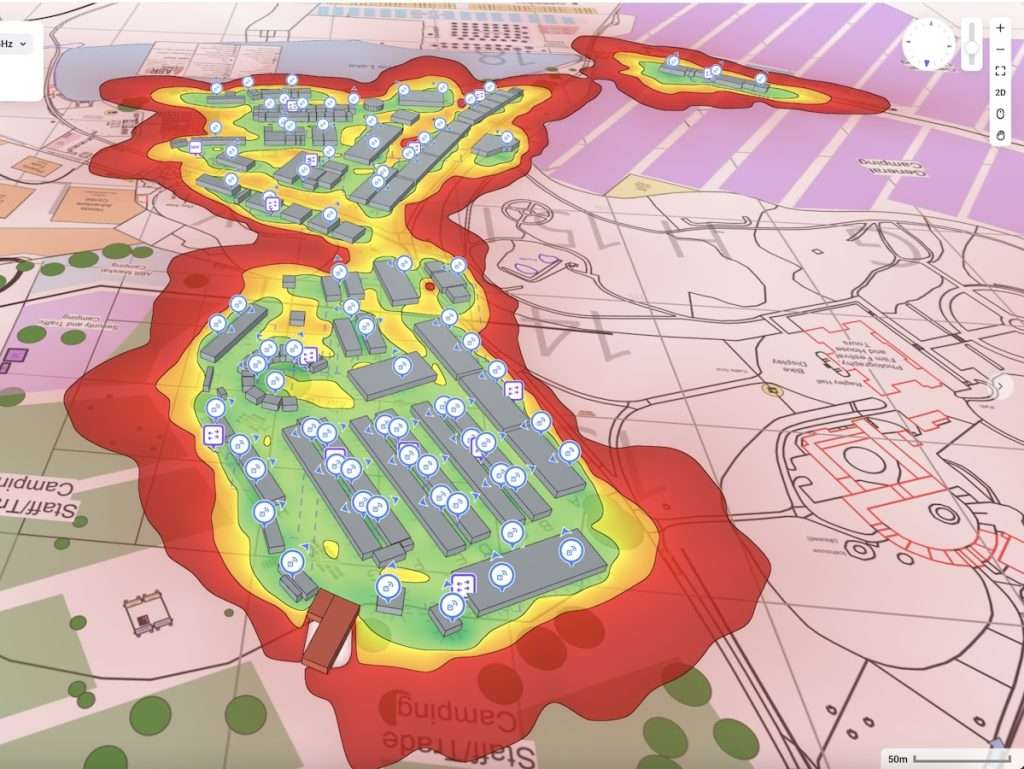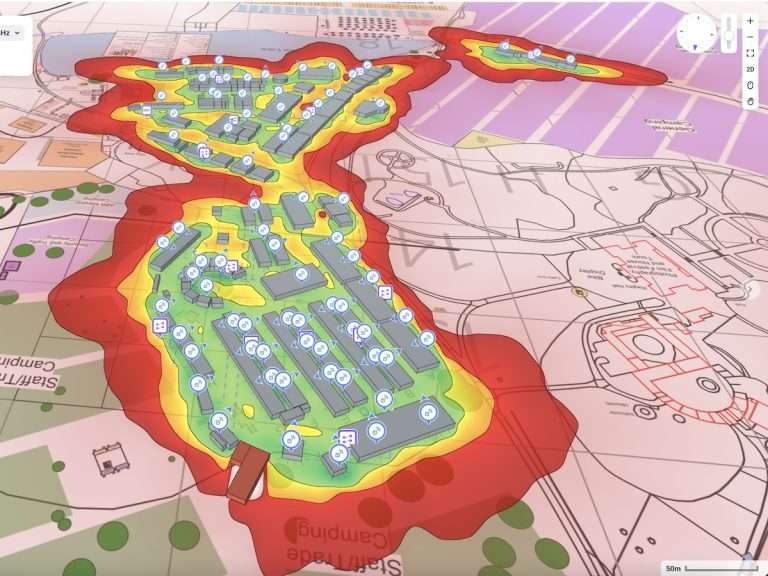You only have to visit social media platforms or talk to traders at a large event to hear of rising frustrations about internet connectivity at events. We’re seeing more and more traders making a stand about their issues with WiFi as it’s now a critical service on site.
At larger events traders are often forced to take all payments through a point-of-sale system managed by the event organisers. The organiser will also provide an integral WiFi solution. Cashless events are also popular, forcing complete transparency of trader revenue.
The challenge for traders here is that in the event of poor connectivity they are left unable to take cash payments in the interim. It’s can be a real problem if the WiFi service isn’t up to scratch.
And traders aren’t in isolation. When you talk to the organisers themselves, they are often struggling to do their job effectively due to drops in connectivity, resulting in loss of communication and the inability to make time-critical decisions.
It’s 2023 and things certainly could do with a shake up.
The issue lies with the WiFi solution
Having experienced all this first hand, we know that if you’re struggling with your event connectivity, the problem is that the event WiFi solutions simply aren’t up to the job required.
It’s a bold statement to make. But we’re going to justify what’s going wrong and how you can make sure that your event WiFi is up to the job.
Changing behaviours
Over the past 10 years, we’ve seen more and more reliance on connectivity, with an increasing number of services being provided online, and a growing number of devices per user.
And as events grow in size, more traders, guests, production crew and guests are vying to get online. It’s only natural that we’re seeing an increasing demand for bandwidth.
In your typical business that has a fixed-line internet supply, an increase in demand isn’t an issue as you will have dedicated bandwidth. However, event WiFi that uses 4G as an internet source will encounter contention.
Contention is where 4G users have to fight for base station radio spectrum and backhaul bandwidth. The more users and devices competing for the 4G, the larger the contention. It gets to a point where there simply isn’t enough 4G to go around.
Trends in event WiFi solutions
IN 2023, most event WiFi providers had crafted a solution that effectively amplifies the 4G for the people that need it most.
Production teams, traders and VIPs will have been connecting via a WiFi solution that grabs more of the 4G and distributes it across the site. If you have the lucky password then you can access the WiFi and get better connectivity.
This worked well – for a while – but now at the larger events, it’s simply not man enough for the job. Why? There’s too much contention on the networks. There isn’t enough bandwidth from 4G/5G to amplify via the WiFi networks.
Tricks used to prioritise important traffic, like restricting access to live streaming sites such as Netflix, Youtube, etc have been the next steps taken by most event WiFi solutions.
But here’s what’s happening now. By blocking these services it means the end user is experience is disjointed and it seems like the internet connection is broken due to pages not loading correctly. The knock-on effect is the client losing faith in the service provided.
The principle is covered in this article on why construction site WiFi is dropping out.
The outfall is that we’re in a situation where connectivity solutions need a change.
This is what you now need to consider when thinking about WiFi for large events.
Getting enough internet to your site
If you’re running a large event, and your event WiFi provider is relying solely on 4G, then be concerned. 4G networks can be more robust in urban locations, but contention can rise and fall on an hourly basis (think of trains pulling into stations for example). The 4G will be built to cope with daily demands, but add 20,000 people at an event and you’re heading for trouble.
If your event is in a rural location then it’s highly likely that the 4G networks won’t be able to handle the volumes of people due to limited number of mobile masts.
Either way, you’ll need to assess the 4G is available at your event location, and factor in the contention issues which are highly likely to lead to problems.
Luckily there are alternative ways to get temporary internet for events. One solution is satellite. But you’ll need someone that can accurately assess the satellite capability on-site. If you’re in a valley then you may not be able to see enough sky for satellite solutions to work properly.
Starlink has been rising in popularity with traders and crew at events, but this increase in adoption could potentially become its downfall. Read more about the pros and cons of Starlink at events.
Achieving the best event internet solution
The answer to obtaining the best event internet service is to properly evaluate the internet resources available. You may find that a mixture of 4G and Satellite is required.
Don’t forget to check whether you can utilise any fixed internet lines in the surrounding areas. At Henley Regatta for example, we beamed the internet service from a leased line over the river to boost connectivity and ensure that we had enough for the expected demand.
Event WiFi
Now that you’ve got the best internet connection/s into your event site, you need to consider carefully how it’s distributed across the site. And this is where it gets a little complicated.
In fact, complicated enough to require some pretty advanced networking skills. Although this isn’t something we can teach in a blog, we can cover some rough guidelines as to what you should be looking for when it comes to event WiFi at large events to ensure reliable connectivity.
Planning
A good provider of WiFi at large events will take time to understand your requirements. This planning phase should be an in-depth process of understanding what your requirements are. By breaking your event site down into what services you need in which locations, your event WiFi provider can come up with a site WiFi design. It may look a little like this.

This WiFi design shows where there is to be great coverage (green), intermittent (yellow) and little to none (red).
By agreeing the design, both parties know exactly what’s expected and SLAs can be set accordingly.
It’s important that this stage is thorough. Changes to the requirements after any plan has been agreed could be considered a scope creep, incurring additional cost, time and could affect quality.
By working closely with your WiFi provider, you should be able to avoid change requests and additional costs throughout the process.
Hardware
Larger events may require high-end hardware to deliver the quality of connectivity required.
Although there is no hard and fast rule for hardware, companies that invest in more expensive, higher end hardware will be more serious about the services they provide.
For example, Cisco, Juniper and Aruba network switches and Aruba, Ruckus and Cisco Wireless Access Points (WAP) should give you added peace of mind that the service provider is up for the job.
Cost
Although we all love to get good value, it’s common that you will pay more for quality. It doesn’t always pay to go for the cheaper quote – and is worth considering points 1 and 2 above when assessing whether a WiFi provider is capable of the job.
Our advice would be to do your due diligence. What events has the provider successfully delivered in the past? Can you speak to their customers to get an honest view of the service and capabilities?
It doesn’t always pay off to go for the first company you find on Google. See how much temporary WiFi for events costs.
The opportunities created with better event WiFi
Think about the potential if the event WiFi solution is good enough for the job, then there’s no reason why the traders shouldn’t benefit from faster payments, more reliable revenue processing and a solution that’s been tried and tested before they arrive on site.
If an event WiFi solution was 100% guaranteed to work, it would save traders a lot of pressure, leaving them free to focus on increasing sales.
In addition, the event producers can be left to manage the event and drive more revenue from sales – whether this be tickets, or goods on site.
So ensuring that you have robust WiFi will could guarantee the success of you event.
If you would like to discuss your event’s connectivity feel free to get in touch.

